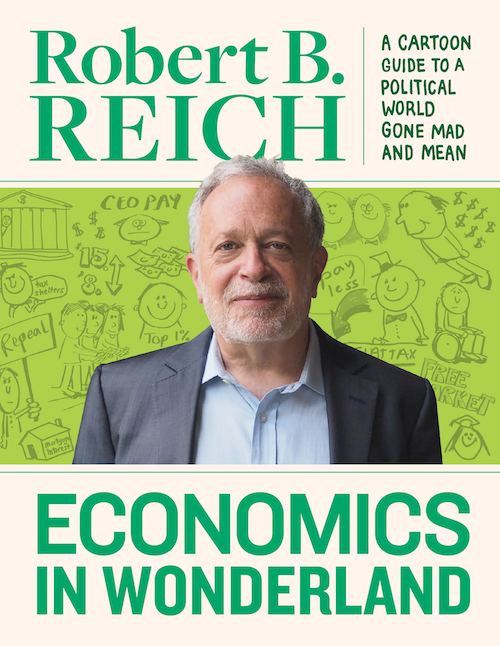The limits of cartoonomics

Let’s be clear: former Labor Secretary Robert B. Reich is a cartoonist, but his latest title from Seattle-based comics publisher Fantagraphics Books, Economics in Wonderland, is not a comic book. The illustrations in the book aren’t, strictly speaking, comics. They’re cartoons. Perhaps this seems like splitting hairs, but it’s an important distinction: comics involve a juxtaposition of words and illustrations, while cartoons are simply funny drawings that accompany the text without enriching the text.
Wonderland is adapted from Reich’s wonderful series of short illustrated economics lectures on YouTube. Here’s a sample:
Without the actual video of Reich drawing the cartoons, they lose something on the page. In the videos, Reich will often go back and cross out a word or a phrase he previously drew for emphasis. In the book, that word or phrase only appears crossed out, and the impact of crossing it out is lost. Basically, you could read the book without looking at a single illustration and you wouldn’t really miss anything. Which is a bummer.
At the Reading Through It Book Club at Third Place Books Seward Park last night, some of our members were frustrated with Wonderland. They weren’t sure who the book’s intended audience was; was it preaching to the choir, one member asked, or was it supposed to win over conservatives? Why didn’t Reich provide more examples of why a higher minimum wage was a good thing, say, or how more people benefit when we tax the rich at a higher rate?
Speaking as someone who has interviewed Reich and reviewed many of his books, I think some of those complaints miss the mark. Reich is interested in building an economic vocabulary for progressives, to give them an array of cohesive ideas through which they can understand and explain the world. He’s an educator first — his preferred title is “Professor Reich,” not “Secretary Reich” — and not a journalist. He is a gifted lecturer and a top-tier economic thinker, and he’s devoting his talents to explaining middle-out economics to a broad audience.
Some members of the Reading Through It Book Club, though, seemed to think that economics isn’t enough, that Democrats need to do a better job of conveying empathy and why government needs more compassion. And others thought Reich's ideas were a waste of time; one member rejected the idea of Universal Basic Income out of hand, for instance, because he said it wasn’t possible.
And then there’s the question of whether economics can get us out of this mess at all. If capitalism demands continual growth in order to be healthy, can capitalism be considered a truly sustainable system? A middle-schooler with one physics class under her belt could tell you that never-ending growth is impossible. Can we spend our way out of the mess that America has become? We were once promised that automation would create 3-day work weeks for everyone; now we’re told that automation will render millions of jobs obsolete, and we can see that technology has blurred the lines between work and personal life in some very uncomfortable ways.
A number of Reading Through It members loved Wonderland and appreciated the way it made economics — an inscrutable field to them, previously — into something that they could easily understand. I, for instance, appreciated Reich’s description of the way the Federal Reserve maintains the complicated relationship between interest rates and inflation. Throughout the book, people found clarity on matters that previously seemed too complex to understand. In that way, Reich’s talent as a teacher became clear. Everyone learned something, and we had an intense 20-minute conversation about whether Universal Basic Income is a tenable Democratic position for the 2020 elections. Not bad for a book of silly cartoons.